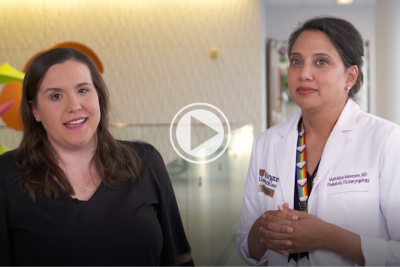I love being a pediatrician. I love it for many reasons, but mostly because of the relationships this particular brand of medicine fosters. I get to know families inside and out, starting on the day a child comes into this world. I experience the highs and the lows right alongside them. So, naturally, I have a hard time letting go when one of those children becomes an adult; and so, too, do moms and dads and the kids themselves – especially if the child has had special needs over the years, and we’ve seen each other even more than a family without any neurodevelopmental issues to manage.
But birthdays inevitably add up. So what do you do when a child turns 18 and mom and dad aren’t the medical decision makers anymore? Transitions are hard, but hopefully these tools can help make this one easier.
When to transition from a pediatrician to an adult physician
When exactly to make the switch will depend on your pediatrician’s practice, your child’s needs, and your comfort level. In my practice, I generally like to wait until a child has graduated from college or is out on his or her own. I find that’s a more natural point than strictly saying, “Age 18, off you go!”
My patients with more involved special needs often stay with me a little longer. As medicine progresses, adult physicians are becoming more familiar with issues like autism; as outcomes improve, they’re seeing more transplant patients and children who survive into adulthood with cystic fibrosis. But those patients often face significant transitions when it comes to specialists, and they tend to stay with their primary pediatrician a little bit longer.
What questions to ask
I advise parents to start talking to their pediatrician about transition in their later teen years. Early conversations lead to better understanding, which leads to smoother transitions. Certainly, as your child nears age 18, talk to your pediatrician. Ask them questions like:
- When does my child need to start seeing an adult practitioner?
- Who do you suggest for their particular needs?
- How do I know whether my child is ready for this transition?
- What do I need to do to make my child ready?
- If my child doesn’t have the capacity to manage his or her own care, what mechanisms do I need to have in place before he or she becomes a legal adult?
- Would you like to talk to my child without me in the room?
That last question is an important one. I think a lot of parents believe we ask them to leave the room so we can ask questions about drug use and sexual activity. While those topics can come up, that’s not the only reason we want one-on-one time with a young adult. The most important part of that interaction is teaching a child how to speak freely with a medical provider.
For patients with greater needs, I’d add the following:
What paperwork do I need to have in place by the time my child turns 18?
When your child turns 18, he or she becomes an adult in the eyes of the law, regardless of special circumstances. As such, the law says they are in charge of their medical care, their personal health information is their own, and I am not allowed to share it with anyone but them – not even their parents. In order for us to discuss anything with a parent, the child has to sign off. As your child nears 18, think about what kind of access you need and they’re comfortable affording you. This can be as simple as mom refilling meds for a child, and as involved as a child who has a developmental delay so significant he can’t possibly make or communicate a medical decision for himself.
For those who want basic access, I recommend a confidentiality waiver – something your pediatrician’s office will have on file to allow parents (or other approved individuals) the ability to call for appointments, medication refills, lab results, or just to talk to the doctor. You could also opt for a health care power of attorney. You can find basic forms online, most of which will require you to list the patient’s name, date the form, and provide the information of the person with decision making authority. Note that in Missouri, you will need to have this form notarized.
For kids who do have a significant chronic condition or are not capable of making their own health care decisions, I recommend a more formal avenue, like pursuing legal guardianship. Legal guardianship does require authorization by the courts, so I recommend parents begin the process well before a child’s 18th birthday.
How do I prepare my child for the transition?
You remember when your child fell when she was little and you knew that if she saw you get upset, she’d be upset? This isn’t totally different. I’ll let you in on a secret – this transition is harder for us than it is for your child. I don’t want to send your child off into the great big world any more than you do, but we have to. Our job is to make sure they’re ready. Here are some tips to make it as smooth as possible:
- Start the conversation early.
- In a child who is physically and intellectually able, make sure he knows the proper name of his diagnosis and basic info about what it is. Encourage him to make a list of questions to discuss with the pediatrician when he’s young, so he feels comfortable asking questions.
- Involve your child in her action plan. Does she have asthma? If she has an asthma attack, it won’t help if mom and dad know what to do, but she doesn’t.
- From an early age, empower your child to own his body. Make sure he knows he is responsible for his person and his health.
- Create a plan with clear benchmarks. At age 15, maybe your daughter with ADHD isn’t great about remembering to take her medicine on time. Teach her to set an alarm. When she’s 16, maybe it’s her responsibility to let mom know when she is down to the last few pills and she needs a prescription refill. By 17, can she call the doctor’s office and make her own appointments?
Change isn’t easy. Not for any of us. But with adequate preparation, we can make it less intimidating. If you have more questions about your child and how to manage health care transitions, I recommend visiting GotTransition.org. They have wonderful resources available for helping children of all ability levels. Your state’s health department website is also a good place to check. And don’t hesitate to talk to your pediatrician. After all, we’ve been in this together from day one.





Comments